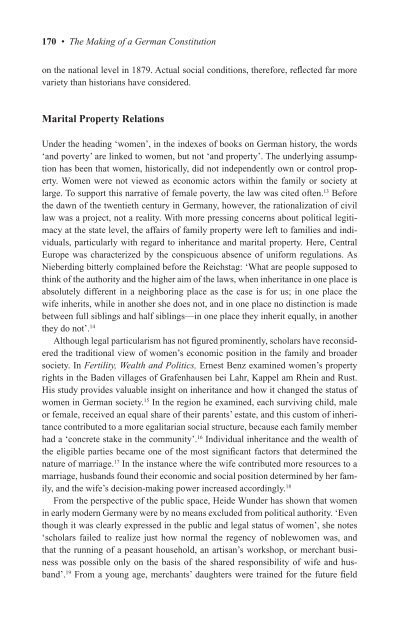Making of a German Constitution : a Slow Revolution
Making of a German Constitution : a Slow Revolution
Making of a German Constitution : a Slow Revolution
Create successful ePaper yourself
Turn your PDF publications into a flip-book with our unique Google optimized e-Paper software.
170 • The <strong>Making</strong> <strong>of</strong> a <strong>German</strong> <strong>Constitution</strong>on the national level in 1879. Actual social conditions, therefore, reflected far morevariety than historians have considered.Marital Property RelationsUnder the heading ‘women’, in the indexes <strong>of</strong> books on <strong>German</strong> history, the words‘and poverty’ are linked to women, but not ‘and property’. The underlying assumptionhas been that women, historically, did not independently own or control property.Women were not viewed as economic actors within the family or society atlarge. To support this narrative <strong>of</strong> female poverty, the law was cited <strong>of</strong>ten. 13 Beforethe dawn <strong>of</strong> the twentieth century in <strong>German</strong>y, however, the rationalization <strong>of</strong> civillaw was a project, not a reality. With more pressing concerns about political legitimacyat the state level, the affairs <strong>of</strong> family property were left to families and individuals,particularly with regard to inheritance and marital property. Here, CentralEurope was characterized by the conspicuous absence <strong>of</strong> uniform regulations. AsNieberding bitterly complained before the Reichstag: ‘What are people supposed tothink <strong>of</strong> the authority and the higher aim <strong>of</strong> the laws, when inheritance in one place isabsolutely different in a neighboring place as the case is for us; in one place thewife inherits, while in another she does not, and in one place no distinction is madebetween full siblings and half siblings—in one place they inherit equally, in anotherthey do not’. 14Although legal particularism has not figured prominently, scholars have reconsideredthe traditional view <strong>of</strong> women’s economic position in the family and broadersociety. In Fertility, Wealth and Politics, Ernest Benz examined women’s propertyrights in the Baden villages <strong>of</strong> Grafenhausen bei Lahr, Kappel am Rhein and Rust.His study provides valuable insight on inheritance and how it changed the status <strong>of</strong>women in <strong>German</strong> society. 15 In the region he examined, each surviving child, maleor female, received an equal share <strong>of</strong> their parents’ estate, and this custom <strong>of</strong> inheritancecontributed to a more egalitarian social structure, because each family memberhad a ‘concrete stake in the community’. 16 Individual inheritance and the wealth <strong>of</strong>the eligible parties became one <strong>of</strong> the most significant factors that determined thenature <strong>of</strong> marriage. 17 In the instance where the wife contributed more resources to amarriage, husbands found their economic and social position determined by her family,and the wife’s decision-making power increased accordingly. 18From the perspective <strong>of</strong> the public space, Heide Wunder has shown that womenin early modern <strong>German</strong>y were by no means excluded from political authority. ‘Eventhough it was clearly expressed in the public and legal status <strong>of</strong> women’, she notes‘scholars failed to realize just how normal the regency <strong>of</strong> noblewomen was, andthat the running <strong>of</strong> a peasant household, an artisan’s workshop, or merchant businesswas possible only on the basis <strong>of</strong> the shared responsibility <strong>of</strong> wife and husband’.19 From a young age, merchants’ daughters were trained for the future field




